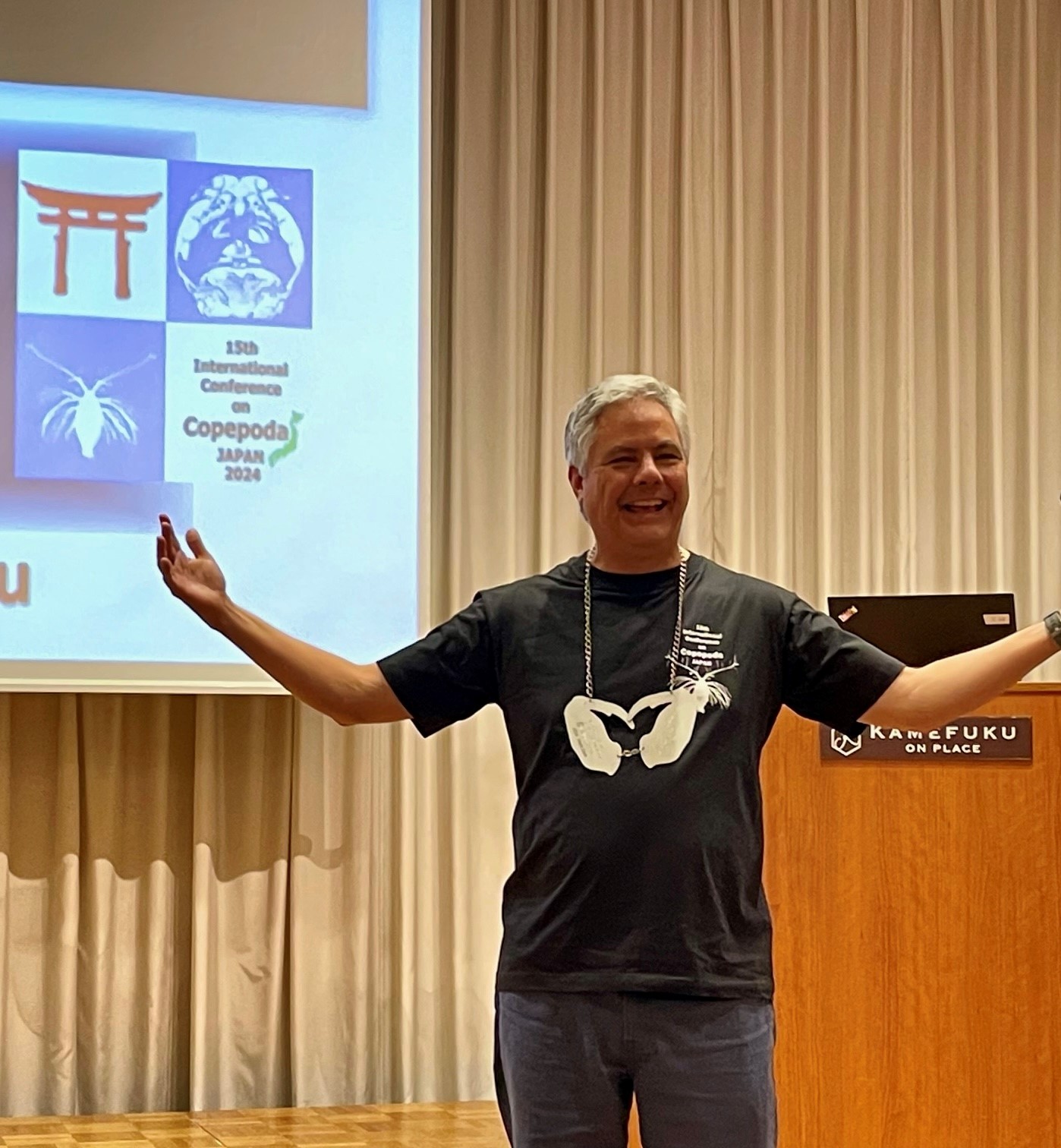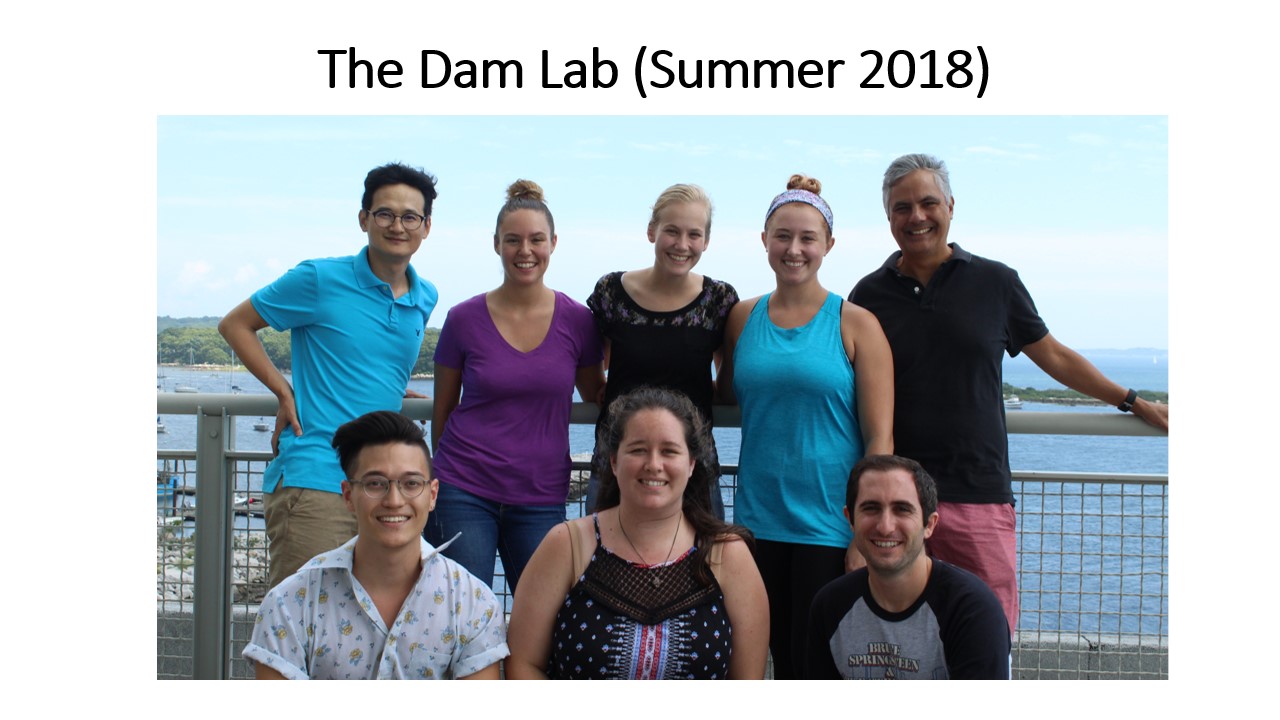Hans G. Dam
(Ph.D., SUNY Stony Brook) Professor of Marine Sciences
I trained as a biological oceanographer. My research interests cover the biology, ecology, and evolution of planktonic organisms, particularly pelagic copepods and toxic dinoflagellates. Earlier in my career, I investigated questions related to the role of planktonic organisms in biogeochemical cycles in the ocean and the formation and fate of marine aggregates. Currently, my interests deal with questions of the evolutionary ecology of plankton, particularly zooplankton adaptation to ocean warming and acidification, and antagonistic interactions between zooplankton and toxic dinoflagellates.
My proudest professional achievement is the training of some excellent graduate students. I encourage my students to become critical thinkers, to work on important questions in the field, and to publish their work promptly.
For news about my lab’s activities, visit our Facebook page or our Twitter feed
Interaction of Grazers and Toxic Algae. Toxic algal blooms are proliferating worldwide, but we understand little of the consequences of such proliferation. We are currently interested in the evolution of grazer adaptation to phytoplankton neurotoxins produced by the dinoflagellate Alexandrium. We have experimentally demonstrated that populations of grazers that experience frequent blooms of toxic Alexandrium have a fitness advantage over those that do not frequently experience such blooms. We have developed methods to identify phenotypes of adaptation to toxic algae and measured fitness costs and advantages of toxin adaptation. We are also actively working on the molecular mechanisms of grazer adaptation to the toxins produced by Alexandrium. New areas of research in the lab are: 1) Novel mechanisms of toxicity (reactive oxygen species) in Alexandrium. 2) Costs and advantages of toxin production in Alexandrium. 3) Grazer-induced toxicity in Alexandrium.
Thermal & Low pH Zooplankton Adaptation. A formidable challenge to ocean scientists is to understand and predict the response of the biota to global change. We employ an experimental evolution approach to measuring zooplankton adaptation and its costs under future climate change conditions (warming, acidification, and combined warming and acidification). We also collaborate with genomic scientists to understand the molecular basis of adaptation.
Oceanography and Management of Long Island Sound. Long Island Sound is one of the most urbanized estuaries in the world and faces multidimensional environmental management issues. I helped found the Long Island Sound Integrated Coastal Observing System (LISICOS) and keep an interest in water quality management for the Sound. In collaboration with G. McManus and the CT Dept. of Energy and Environmental Protection, we currently have a zooplankton monitoring program in place. Our interests is to understand how eutrophication and climate change affect zooplankton populations and communities.
Recent Representative Research Grants
Linking upper thermal limits to fitness proxies in Arctic Zooplankton. National Science Foundation.
Linking eco-evolutionary dynamics of thermal adaptation and grazing in copepods from highly seasonal environments. National Science Foundation.
ECOHAB 2017: Are growth and toxicity of the dinoflagellate Alexandrium controlled by grazer-induced defense? ECOHAB program, NOAA.
Transgenerational phenotypic and genomic responses of marine copepods to the interactive effects of temperature and CO2. National Science Foundation.
Response of zooplankton to projected changes in temperature in Long Island Sound – NOAA, CT Sea Grant Program
Chemical defenses in a toxic dinoflagellate: Mechanisms and constraints – National Science Foundation
Monitoring mesozooplankton and microzooplankton in Long Island Sound. – Environmental Protection Agency/CT DEEP
Current Students & Research Staff
Rowan Batts, Ph.D student
Lisa Piastuch, Ph.D. student
Jeffery Lee, Visiting Ph.D. student
Sunnidae Galien, M.S. student
Gihong Park – Associate Scientist
Former Students (alphabetically)
Christina Batoh – Ph.D. 2012
Zair Burris – Ph.D. 2014
Mari Butler – M.S. 1993
Lihua Chen – Ph.D. 2010
Sean Colin – Ph.D. 2002
Ben Cournoyer – M.S. 2013
James deMayo – Ph.D. 2021
David Detlor – M.Sc. 1998
Leah Feinberg – M.S. 1998
Michael Finiguerra – Ph.D. 2013
Michael Ford – M.Sc 2000
Sheean Haley – M.S. 2002
Matthew Holmes-Hackerd, M.S. 2022
Ewaldo Leitao, jr.,- Ph.D. 2024
Caroline A. Loglisci – M.S. 2007
Gihong Park – Ph.D. 2018
Kimberly Philips – M.S. 1996
Matthew Sasaki – Ph.D. 2020
Amy Smith Siuda – Ph.D. 2007
Kam Tang – Ph.D. 2000
Xinsheng Zhang – Ph.D. 1997
Courses Taught
Undergraduate Courses:
Selected Honors
President, World Association of Copepodologists (2022-2024)
Maxilliped Lecture, 15th International Conference on Copepoda (2024)
UConn Alumni Association Excellence in Graduate Education Award (2021)
Vice President, Connecticut Academy of Arts and Sciences (2016-)
Fellow, American Association for the Advancement of Science (2015)
Sustaining Fellow, Association for the Sciences of Limnology and Oceanography (2016)
Member of the Connecticut Academy of Arts and Sciences (2009)
Member of the Connecticut Academy of Science and Engineering (2007)
National Science Foundation Ocean Sciences CAREER award (1995)
Augmentation award for science and engineering training (AASERT) from the Office of Naval Research (1994)
Recent Representative Publications
Click here to see my publication record (Google Scholar)
Click here to download my papers on Research Gate
Underline: Student, *: Postdoc
Brennan, R.S., J.A. deMayo, M. Finiguerra, H. Baumann, H.G. Dam, and M. Pespeni. 2025. Complementary genetic and epigenetic changes facilitate rapid adaptation to multiple global change stressors. Proceedings of the National Academy of Sciences, 122(29), e2422782122. https://doi.org/10.1073/pnas.2422782122
Park, G* and H.G. Dam. 2025. Multiple defense is an effective anti predator strategy in dinoflagellates. ISME Communications. Volume 5, Issue 1, January 2025, ycaf029. https://doi.org/10.1093/ismeco/ycaf029
Sasaki, M.C*, M. Finiguerra, H.G. Dam. 2024. Seasonally variable thermal performance curves prevent adverse effects of heatwaves. J. Animal Ecology. Journal of Animal Ecology, 00, 1–11. https://doi.org/10.1111/1365-2656.14221
Sasaki, M.C*, M. Finiguerra, H.G. Dam. 2024. Seasonally variable thermal performance curves prevent adverse effects of heatwaves. J. Animal Ecology. Journal of Animal Ecology, 00, 1–11. https://doi.org/10.1111/1365-2656.14221
Vermandele, F., M. Sasaki*, G. Winkler, H.G. Dam, D. Madeira, and P. Calossi. 2024. When the going gets tough, the females get going: sex-specific physiological responses to simultaneous exposure to hypoxia and marine heatwave events. Global Change Biology. 30(10), e17553. https://doi.org/10.1111/gcb.17553
Leitao, E. D.F. Castellanos, G. Park, and H.G. Dam. 2024. Antagonistic interactions of the dinoflagellate Alexandrium catenella under ocean warming and acidification. Harmful Algae. 134: 1012625 https://doi.org/10.1016/j.hal.2024.102625
Park, G.*, L. Norton, D. Avery, H.G.Dam. 2023. Grazers modify the dinoflagellate relationship between toxin production and cell growth. Harmful Algae. 126, 102439.
Brennan, R.S. J.A. deMayo, H.G. Dam, M.B. Finiguerra, H. Baumann, V. Buffalo, & M. H. Pespeni. 2022. Experimental evolution reveals the synergistic genomic mechanisms of adaptation to ocean warming and acidification in a marine copepod. Proc. Nat. Acad. Sci. USA 119 (38) e2201521119
Highlighted paper in PNAS commentary: https://doi.org/10.1073/pnas.2214263119
Dam, H.G. et al. 2021. Rapid, but limited, adaptation of marine zooplankton
to simultaneous warming and acidification. Nature Climate Change. 11: 780–786
Sasaki, M. and H.G. Dam. 2019. Integrating patterns of thermal tolerance and phenotypic plasticity with population genetics to improve understanding of vulnerability to warming in a widespread copepod. Global Change Biology. 25(12): 4147-4164.

| hans.dam@uconn.edu | |
| Phone | 860-405-9098 |
| Fax | 860-405-9153 |
